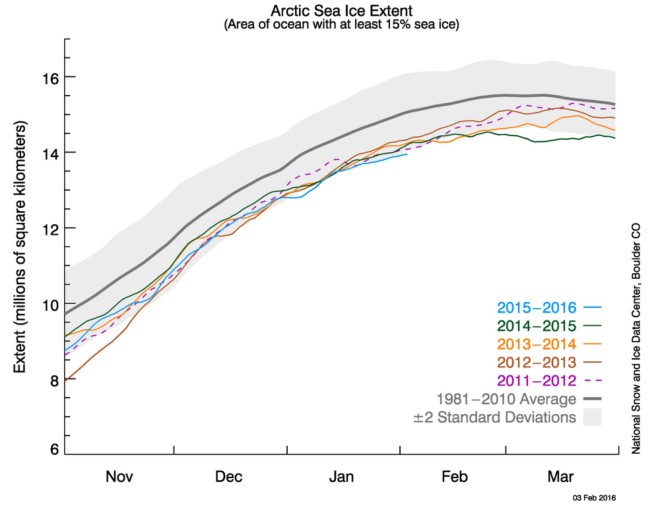 The National Snow and Ice data Center keeps track of the amount of sea ice over the Arctic and updates it all daily. Over time, each and every year, it keeps getting lower and lower and this January was the lowest ever recorded – the above is their chart illustrating exactly that. Notice that the blue line represents this season (2015-2016) and records exactly where things soon on 3rd February. Never before in all the time they have been recording has the sea ice cover in the Arctic been this low in January.
The National Snow and Ice data Center keeps track of the amount of sea ice over the Arctic and updates it all daily. Over time, each and every year, it keeps getting lower and lower and this January was the lowest ever recorded – the above is their chart illustrating exactly that. Notice that the blue line represents this season (2015-2016) and records exactly where things soon on 3rd February. Never before in all the time they have been recording has the sea ice cover in the Arctic been this low in January.
They explain …
Arctic sea ice extent during January averaged 13.53 million square kilometers (5.2 million square miles), which is 1.04 million square kilometers (402,000 square miles) below the 1981 to 2010 average. This was the lowest January extent in the satellite record, 90,000 square kilometers (35,000 square miles) below the previous record January low that occurred in 2011. This was largely driven by unusually low ice coverage in the Barents Sea, Kara Sea, and the East Greenland Sea on the Atlantic side, and below average conditions in the Bering Sea and Sea of Okhotsk. Ice conditions were near average in Baffin Bay, the Labrador Sea and Hudson Bay. There was also less ice than usual in the Gulf of St. Lawrence, an important habitat for harp seals.
Yes, January was unusually warm, but this is no seasonal blip, the trend over each and every successive season since 1981 is rather clear. It is of course rather important to not simply consider one point in time, but to look over a period of time at the trend and direction that things are moving in. That clearly reveals that this is all part of that ongoing trend …
![]() I recently entered into a discussion with a chap who was attempting to assert that Climate Change is a complete con and his basis for this was that there is no such thing as a global temperature, hence was not rising (Yes, he had been reading “that” article in the Atlantic and was simply parroting it) If you truly do doubt, then you need look no further than what it perhaps the biggest global thermometer of them all, the Arctic itself Clearly that is screaming out that Climate Change is indeed quite real.
I recently entered into a discussion with a chap who was attempting to assert that Climate Change is a complete con and his basis for this was that there is no such thing as a global temperature, hence was not rising (Yes, he had been reading “that” article in the Atlantic and was simply parroting it) If you truly do doubt, then you need look no further than what it perhaps the biggest global thermometer of them all, the Arctic itself Clearly that is screaming out that Climate Change is indeed quite real.